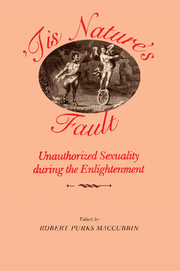Book contents
- Frontmatter
- Contents
- Introduction
- “The Secrets of Generation Display'd”: Aristotle's Master-piece in Eighteenth-Century England
- Sexual Imagination as Revealed in the Traité des superstitions of Abbé Jean-Baptiste Thiers
- Married but not Churched: Plebeian Sexual Relations and Marital Nonconformity in Eighteenth-Century Britain
- Moral Values in “La Suite de l'Entretien”
- Prostitution and Reform in Eighteenth-Century England
- The Properties of Libertinism
- Between the Licit and the Illicit: the Sexuality of the King
- The Sublimations of a Fetishist: Restif de la Bretonne (1734-1806)
- Sodomitical Subcultures, Sodomitical Roles, and the Gender Revolution of the Eighteenth Century: The Recent Historiography
- The Priest, the Philosopher, and Homosexuality in Enlightenment France
- The Pursuit of Homosexuality in the Eighteenth Century: “Utterly Confused Category” and/or Rich Repository?
- Sodomy in the Dutch Republic during the Eighteenth Century
- Parisian Homosexuals Create a Lifestyle, 1700-1750: The Police Archives
- The Censor Censured: Expurgating Memoirs of a Woman of Pleasure
- Chthonic and Pelagic Metaphorization in Eighteenth-Century English Erotica
- Modes of Discourse and the Language of Sexual Reference in Eighteenth-Century French Fiction
- The Mélange de poésies diverses (1781) and the Diffusion of Manuscript Pornography in Eighteenth-Century France
- Obscene Literature in Eighteenth-Century Italy: an Historical and Bibliographical Note
Sodomy in the Dutch Republic during the Eighteenth Century
Published online by Cambridge University Press: 06 July 2010
- Frontmatter
- Contents
- Introduction
- “The Secrets of Generation Display'd”: Aristotle's Master-piece in Eighteenth-Century England
- Sexual Imagination as Revealed in the Traité des superstitions of Abbé Jean-Baptiste Thiers
- Married but not Churched: Plebeian Sexual Relations and Marital Nonconformity in Eighteenth-Century Britain
- Moral Values in “La Suite de l'Entretien”
- Prostitution and Reform in Eighteenth-Century England
- The Properties of Libertinism
- Between the Licit and the Illicit: the Sexuality of the King
- The Sublimations of a Fetishist: Restif de la Bretonne (1734-1806)
- Sodomitical Subcultures, Sodomitical Roles, and the Gender Revolution of the Eighteenth Century: The Recent Historiography
- The Priest, the Philosopher, and Homosexuality in Enlightenment France
- The Pursuit of Homosexuality in the Eighteenth Century: “Utterly Confused Category” and/or Rich Repository?
- Sodomy in the Dutch Republic during the Eighteenth Century
- Parisian Homosexuals Create a Lifestyle, 1700-1750: The Police Archives
- The Censor Censured: Expurgating Memoirs of a Woman of Pleasure
- Chthonic and Pelagic Metaphorization in Eighteenth-Century English Erotica
- Modes of Discourse and the Language of Sexual Reference in Eighteenth-Century French Fiction
- The Mélange de poésies diverses (1781) and the Diffusion of Manuscript Pornography in Eighteenth-Century France
- Obscene Literature in Eighteenth-Century Italy: an Historical and Bibliographical Note
Summary
The introduction of Calvinism in the emerging Dutch Republic seems to have had little effect on conceptions of morality. Legislation against sex crimes, for example, was little changed. The Reformed ministers were struggling for stricter observance of Calvinist norms of behavior; but in a society in which the Reformed church was not the state religion, the clergy's influence was necessarily less formal and less direct than in England or France. Synods asked for stricter legislation against such vices as inebriety, dancing, theatre, luxury, and other intemperances; but public authorities did not yield to these puritan tendencies. The Calvinist church, though privileged, had to rely on its own methods to induce change in attitudes and behavior of its members. This was effected by means of the discipline (censura morum) exercised by the local consistories and regional synods.
Legislation on moral issues was gradually adapted to Calvinist norms, but this does not necessarily imply that it was stiffened or puritanized. In conformity with Reformed ecclesiastical dogma regarding the nonsacramental character of marriage, divorce was introduced, and civil marriage for dissenters was made a legal option in Holland after 1580. However, divorce was neither advertised nor otherwise promoted. Marriage for life remained the ideal alliance between man and woman.
New “reformed” secular legislation was introduced; but no special attention to sex crimes can be traced. Adultery, prostitution, incest, sodomy, and bestiality continued to be considered particularly heinous crimes; it appears, however, that during the seventeenth century they were not singled out for punishment that was exceptionally severe by the standards of the day, which frequently imposed corporal and capital punishment.
- Type
- Chapter
- Information
- 'Tis Nature's FaultUnauthorized Sexuality during the Enlightenment, pp. 169 - 178Publisher: Cambridge University PressPrint publication year: 1988

